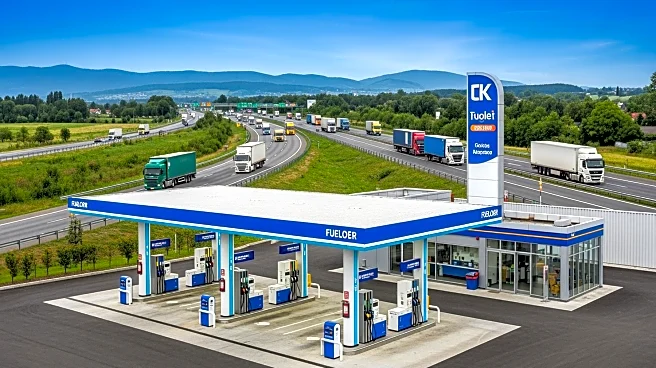What's Happening?
RoadFlex, a Visa-backed fleet card and expense management platform, has partnered with Refuel to expand fueling options for commercial and government fleets. This collaboration adds over 250 new fueling sites to RoadFlex's discount network, enhancing
convenience and savings for fleet operators. Additionally, Virginia has opened a new propane autogas refueling station near Richmond International Airport, supporting local fleets and reducing emissions. NCR Voyix Corporation has also partnered with Corpay to expand fleet card acceptance at U.S. fuel stations, enhancing support for trucking fleets.
Why It's Important?
These developments are significant for the trucking industry as they provide expanded fueling options and cost-saving opportunities for fleet operators. The partnerships and new infrastructure support the transition to cleaner fuel alternatives, such as propane autogas, which can reduce emissions and operating costs. For fleet operators, these initiatives offer greater flexibility and convenience, potentially improving operational efficiency and sustainability. The expansion of fleet card acceptance also enhances payment solutions, streamlining transactions and supporting digital commerce in the trucking sector.
What's Next?
As these partnerships and infrastructure developments progress, fleet operators can expect increased access to fueling options and enhanced payment solutions. The focus on cleaner fuel alternatives may drive further investments in sustainable transportation technologies and infrastructure. Stakeholders in the trucking industry may explore additional collaborations to expand fueling networks and improve efficiency. The success of these initiatives could influence broader industry trends, encouraging the adoption of innovative solutions to address environmental and operational challenges.
Beyond the Headlines
The expansion of fueling options and payment solutions reflects a broader shift towards sustainability and digital transformation in the trucking industry. These initiatives may lead to long-term changes in fleet management practices, emphasizing the importance of environmental responsibility and technological integration. The focus on cleaner fuels and efficient payment systems could also influence regulatory policies and industry standards, promoting innovation and collaboration across the sector.














